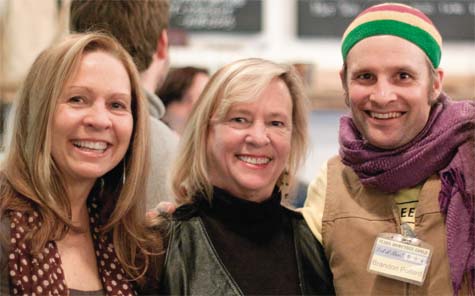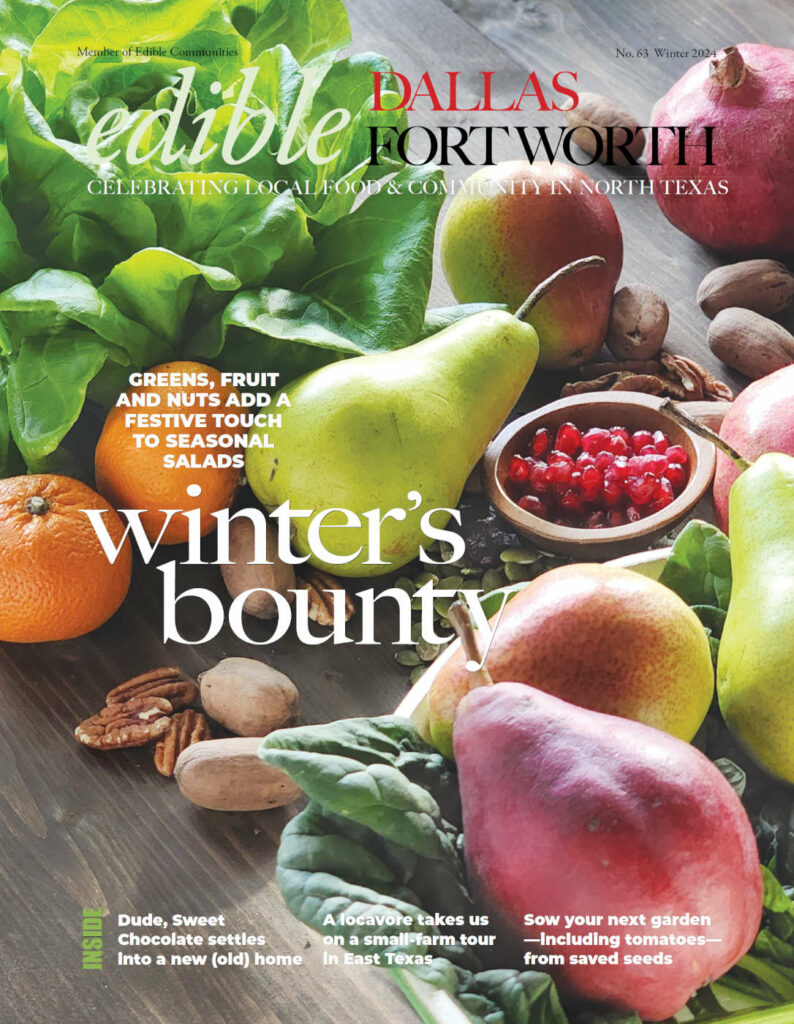 Terri and Nanci Taylor with Brandon Pollard of the Texas Honeybee Guild
Terri and Nanci Taylor with Brandon Pollard of the Texas Honeybee Guild
photo by Lauren McClure
Grasping the signifi cance of small and subtle things isn’t always easy, writes David Hopkins in his story “In Appreciation of Honeybees.” Our North Texas angels of agriculture, the honeybees, are at risk again this spring. Besides a barrage of stresses and maladies, their hives are being threatened by our region’s planned use of pesticides in the ongoing war on mosquitoes. With plans for ground and aerial spraying in place, many North Texas health offi cials are ready to do whatever is necessary to prevent another outbreak of the mosquito-borne West Nile virus.
Two things most of us can agree upon: we don’t want another West Nile outbreak, and equally, we don’t want our methods of preventing an epidemic to compromise our community’s health. What course of action keeps us safe today without endangering our environment and the health of our families in the long term? Th e environmentalist in me has grave concerns while the journalist in me keeps looking for answers. I appreciate those—on both sides of the debate—who continue to research, ask questions and listen, bearing in mind all that’s at stake.
In the battle to protect our benefi cial pollinators, there are no greater warriors than Susan and Brandon Pollard. Each month, their Texas Honeybee Guild reaches thousands with an urgent message: honeybees matter to the health of our national food supply. Once ambivalent about the importance of bees, writer David Hopkins was converted by these two self-proclaimed bee-vangelists. Photographer Danny Fulgencio was already a believer. His haunting silhouette of Brandon tending to his hives is on the cover of this issue.
There is nothing subtle or small about the impact that Gus Katsigris has had on the local culinary community. His former students from El Centro Food and Hospitality Service Institute are at the helm of restaurants and food-related businesses all around the Metroplex. Writer Kim Pierce has known Gus since 1970 when they were both working at El Centro and beginning their lives in Dallas. In her story “Th e Indelible Legacy of Gus Katsigris,” Kim returns with him to his Greek birthplace and traces the American journey of this charismatic and beloved teacher.
While times have been diffi cult for conventional dairies in our region, the number of producers and the size of herds in the High Plains of Texas have been steadily growing. Find out why in Kelly Yandell’s enlightening article “Th e State of Milk In Texas.” Learn how several local dairies have stayed in business by embracing the belief that smaller is better.
For four years, Edible Dallas & Fort Worth has told the stories of those who strive to make North Texas a better place. As we begin our fi ft h year, we are so grateful for our advertisers and the creative team who make it possible. Here’s to those who teach us to care; to those who continue to fi ll these pages with their food, their fl air, their love.
Please do your part to prevent another West Nile outbreak. Eliminate standing water on your property. According to Texas A&M AgriLife Extension Service, a single container the size of a soda can is capable of producing dozens to hundreds of mosquitoes a month.
– Terri
As a kid, TERRI TAYLOR refused to eat her vegetables. Her veggie-phobia was cured in 1977 when she spent eight months working on farms in Norway and France. She studied journalism at UT-Austin and received a master’s degree in liberal arts from SMU. Her short story “Virginia” can be found in Solamente en San Miguel, an anthology celebrating the magical Mexican town of San Miguel de Allende. She has written for Edible DFW since its inaugural issue in 2009. She became the magazine’s editor in 2010 and is the editor of Edible Dallas & Fort Worth: The Cookbook.
- Terri Taylorhttps://www.edibledfw.com/author/ttaylor/
- Terri Taylorhttps://www.edibledfw.com/author/ttaylor/
- Terri Taylorhttps://www.edibledfw.com/author/ttaylor/
- Terri Taylorhttps://www.edibledfw.com/author/ttaylor/









